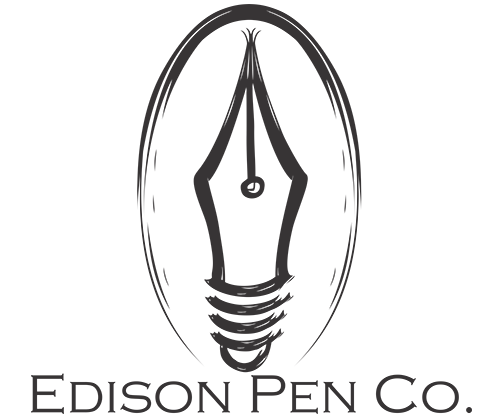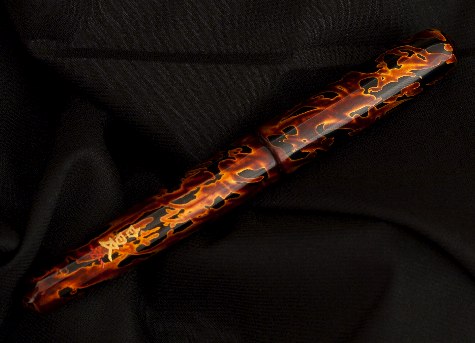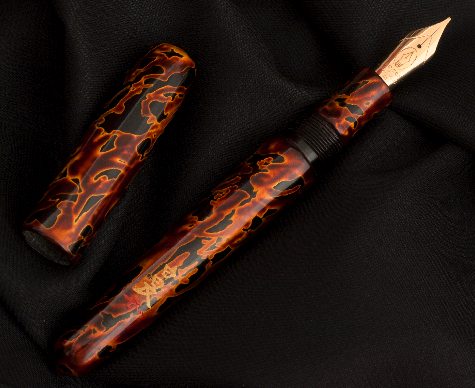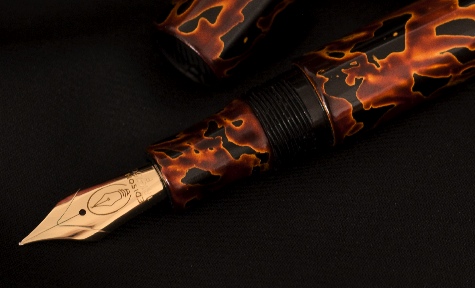
The Edison Pen Company is proud to announce a collaborative project with Ernest Shin, of Hakumin Urushi Kobo.
Most of you know enough about the Edison Pen Company. Here’s an introduction to Hakumin Urushi….
Hakumin Urushi, run by Ernest Shin, is a US-based studio devoted to working with the Japanese tradition of lacquerware and exposing it within the United States as well as the western world. Although Urushi is not unknown outside of Japan, many have only been exposed to a relatively small range of what is possible when using lacquer. While these techniques including the famed Maki-e are certainly praiseworthy works of art, they only touch on a small fraction of everything that is Urushi.
Japanese lacquerware (or Urushi, as it is also known by its Japanese name) has a history spanning over several millennia. Over that time, lacquer production has reached a level of complexity that is rarely seen in the world of arts and crafts. Between the versatility of the lacquer itself and ingenuity of the craftsman, there have developed hundreds of different techniques to create exquisite works of art from the perfectly polished deep black so closely associated with Urushi, to meticulous paintings with sprinkled gold and silver, to the exquisite patterns created as much through the whim of chance as the mastery of the craftsman.
Urushi works particularly well with fountain pens because of it’s closeness to the user. As much as it is beautiful in its appearance, a piece of lacquerware is meant to be touched–to be physically experienced. Urushi has always been used for utilitarian goods in Japan, and specifically for those that are meant to be picked up or held in the hand–small soup bowls, inro and tea caddies to name only a few. It only makes sense that something as close to the user as a writing instrument be finished with lacquer.
So what is the collaboration with Edison and Hakumin Urushi?
Edison and Hakumin Urushi will create a Tsugaru-nuri version of the Pearl. This will be a limited edition. The plan is for ten pens, but if demand is high enough, this may be increased to a limited edition of twenty.
Tsugaru-nuri is one of the regional forms of lacquerware produced in Japan and is named for Tsugaru, Aomori Prefecture in Japan. The range of techniques uniquely derives its patterns using serendipitous means. A textured surface is created through the use of various materials such as seeds or burnt rice husks, or mixtures of various substances with Urushi, such as egg whites or tofu. This layer is then lacquered over with contrasting colors and after curing, the whole piece is then sanded smooth finally revealing the distinctive patterns of Tsugaru-nuri.
The particular technique to be used for these pens is called Karanuri, one of several techniques considered Tsugaru-nuri. After the meticulous application of the first layers of lacquer, the same used for standard unadorned Urushi pieces, an uneven layer of lacquer is applied using a mixture of urushi and egg whites, a sticky, gel-like mixture that resists running and dripping prior to curing. The mixture is carefully applied ensuring that the texture is pronounced enough to create the desired patterns while not too thick to avoid the wrinkles typically caused by curing an overly thick layer of lacquer.
After a slow and extensive curing process, the uneven layer covered over with multiple layers in contrasting colors, in this case, 23 karat gold powder and translucent Urushi. Once these layers are fully cured the piece is sanded smooth, just enough to reveal the intricate patterns of Karanuri. Afterwards, the piece is finally polished meticulously to bring the surface to the deep shine so distinctive of Urushi.
How will this come together?
Please visit the Urushi Pearl Project Page for more details as well as progress pictures…
Brian at Edison





.jpg)

sharp.jpg)